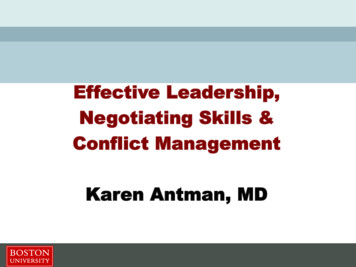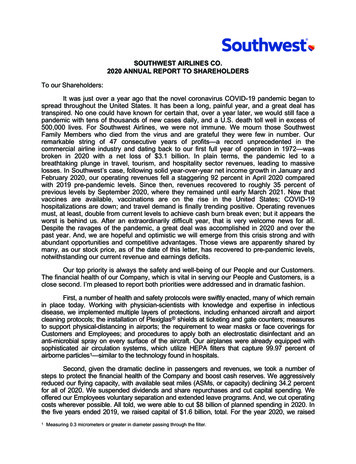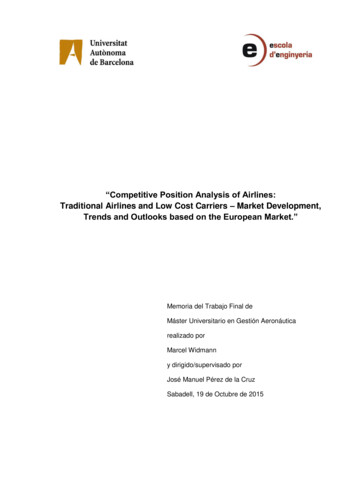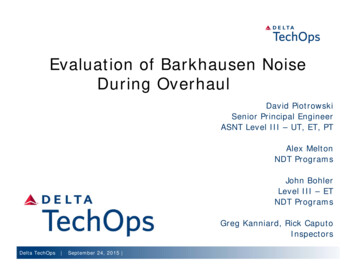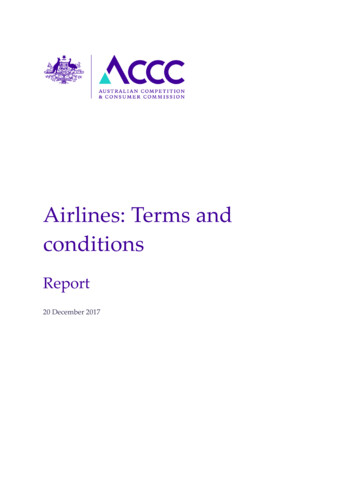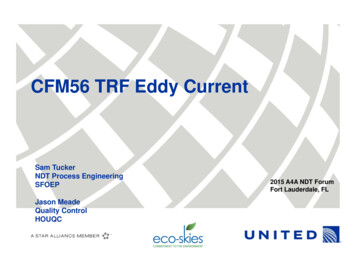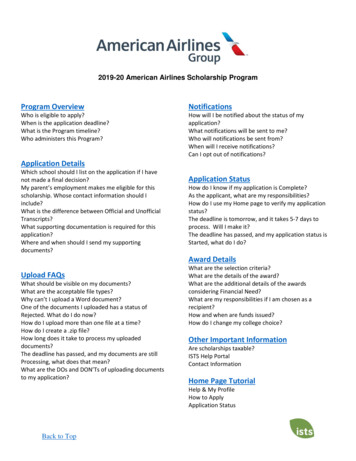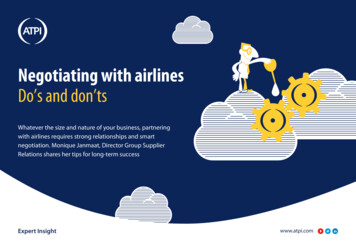
Transcription
Negotiating with airlinesDo’s and don’tsWhatever the size and nature of your business, partneringwith airlines requires strong relationships and smartnegotiation. Monique Janmaat, Director Group SupplierRelations shares her tips for long-term successExpert Insightwww.atpi.com
2Booking the lowest or best value fare is only the tip ofthe iceberg when it comes to managing your spend withairlines. Short-term savings must be balanced againstlong-term value, especially when dealing with highvolumes of bookings. Often, the best long-term strategyis to set up preferred partner arrangements with airlines,where you offer a guaranteed share of your air spend to aparticular supplier in return for preferential prices.To make that partnership a success on both sides, you need tounderstand how the airline industry fundamentally works, whatchallenges you may encounter and how to deliver what your airlinepartner needs most on terms that suit you best.Monique Janmaat, Director Group Supplier RelationsMonique is Head of Group Supplier Relations for ATPI and based in theSchiphol-Rijk office in The Netherlands.www.atpi.comThese do’s and don’ts, gathered from years of experience in the airlinesector, provide an introduction to successful airline partnerships.We hope you find them useful.What’s inside1 Airline revenue management2 Understanding airline fare classes3 Airline negotiation do’s4 Airline negotiation don’ts5 The value of your TMC
3www.atpi.comAirline revenue managementJust like food, theatre tickets and cut flowers, airline seatsare a perishable commodity. If seats aren’t sold when theairplane takes off, their value vanishes. So to get the bestpossible yield from each flight, airlines use a process ofrevenue management where seats are assigned codes orclasses that maximise their highest potential yield.The lower classes might be advance-booked seats with littleflexibility, while higher classes may give the traveller more options,or be sold in peak travel seasons. The actual fares will vary from dayto day or hour to hour as the departure date approaches. To sell asmany higher value seats as possible, airlines use complex algorithmsand cumulative data to plan and update their prices from first saledate right up to take-off time.When going into partnership with airlines, it’s essential to understandthe basics of how they price so you can get the most out ofyour travel budget and negotiate most effectively with yoursupplier. Your travel management company (TMC) has in-depthunderstanding of revenue management processes and canreally help you and your procurement department to gaininsight here.
4www.atpi.comUnderstanding airline fare classesAirline revenue management is complex. So, for those not familiar with howit all works, fare or booking classes are entirely different from cabin classes(which are the level of service you will receive on the airline).Airline classes differ by carrier, but the breakdown of fare classes for a large European carrierlooks something like the table to the right – you can see that each cabin class has its ownlist of fare classes. For example:Class of service Booking classFirstFAPBusinessJCDZIRPremium Economy W EEconomyYBMUHQVWSTLKONEach fare has different rules attached to it that include what days (and sometimes times ormonths) you’re allowed to travel, how it can be combined with other fares on a multi-legjourney, and a deadline for purchasing it, e.g. three weeks in advance.
5www.atpi.comAirline negotiation do’s.Think local before you go global If you have a large airtravel budget, you might think greater savings can beachieved by spending your budget with one partner toget one great rate. But in practice, it makes more sense tothink bottom-up.Build strong relationshipsOnce you’ve established the airline partnerships that work bestfor you, you’ll need to put continued effort into keeping thoserelationships strong. Remember that a partnership must go bothways – if things are going well for you right now, don’t be temptedto capitalise on that at your partner’s expense. When the tables areThere may be local-level suppliers in very competitive marketsturned further down the road, you may find them doing the samewho can offer you better deals dollar-for-dollar, even though yourto you.spend with them is a small proportion of your whole budget. Whenchoosing who to do business with, consider local markets first, thenBe transparent and flexiblemove up to regional, pan-regional and global levels. Your smallerNo matter how big the figures, negotiation always comes downdeals could add up to bigger overall savings.to dealing with people. Being authentic and honest in yournegotiations fosters trust, and if you’re willing to be openabout what you can and can’t do, you’re more likely to findSell in the soft benefitsthat your airline partner will return the favour, and helpIf there’s not much wiggle-room on the fare discounting side ofyou out where they can. Credibility, supported by datathings, remember that negotiating on soft benefits like loyaltyand firm travel policies carries an intrinsic value.perks, upgrades, waivers and favours can all help to swing a deal.
6www.atpi.comAirline negotiation don’ts.Put all your eggs in one basketBrowbeat or be browbeatenIt’s advice that has stood the testRemember, best-in-class discounts are earned by demonstrating thatof time, and it definitely appliesyou can deliver on volume. If you have been unable to meet yourto your airline partnerships. Bevolume commitments, don’t be tempted to use withholding yourpragmatic, be flexible, and bebusiness as a bargaining chip – all it does is weaken the partnershipwilling to spread your spend acrossand jeopardise the chance of good business in the future. Instead,secondary and tertiary suppliers if itadopt a collaborative, open approach to solving the problemgives you the best outcome and the besttogether as partners.coverage overall. Remember – everyone wants your business, butsome may be more willing to demonstrate it than others.Let paperwork slow you downIn the airline business, things change fast. Legal processes on theOvercommit or undersellother hand tend to be slow. Waiting for contracts to be drawnIf you’ve promised to commit a percentage of business you can’tup or updated can mean costly delays and restrictions tofulfil, it’s better to be honest about it. Similarly, it’s unwise to miss outbusiness. As a result, many companies are moving towardson opportunities by being over-cautious in your commitments. Keep‘evergreen’ contracts, which set out the fundamentalon top of the data to make sure you have an accurate picture of whatbasis of the partnership while allowing you the flexibilityyou have to offer your partners. Your account manager can help youto change terms based on mutual needs andgather the data and collate it so that you have the vital figures atopportunities in the shorter term. This frees you upyour fingertips when it’s time to seal that all-important deal.to get the best value out of your partnership.
7www.atpi.comThe value of your TMCTravel management companies know the airline businessinside out, and have industry connections that can helpopen doors that would otherwise be closed to you.Many airlines lack the resources to make direct connections with all butthe biggest businesses, but with your TMC acting as intermediary, you canreach out to airlines and make beneficial business relationships. Your TMCis your connection to an untapped world of potential airline partners.Make contactContact Monique or theATPI team to discusshow best to negotiatewith airlines and manageyour supplier relationships:hello@atpi.comFor examples of case studies and more how-to guides,visit the ATPI Knowledge Hub.
8www.atpi.comAbout the expertWant to know more?Monique is Head of Group Supplier Relations for ATPIand based in the Schiphol-Rijk office in The Netherlands.For examples of case studies and more how-to guides,visit the ATPI Knowledge Hub.She has a wealth of knowledge and industry experience, built up viaa track record of over 25 years in the Travel Management business,where she has worked in various role from Account Managementto Operations. The last 13 years within ATPI Monique has heldresponsibility for Group Supplier Relations.
ATPI is among the world’s leading travel managementcompanies. Our dynamic and innovative approach tosavings and service has earned us one of the highestclient retention rates in the industry.With over 100 offices worldwide, the company has successfuloperations in corporate travel, corporate event management,online travel technology and specialist travel management fora number of key industries.Published: 10.14www.atpi.com
the basics of how they price so you can get the most out of your travel budget and negotiate most effectively with your supplier. Your travel management company (TMC) has in-depth understanding of revenue management processes and can really help you and your procurement department to gain insight here. Airline revenue management . Airline revenue management is complex. So, for those


